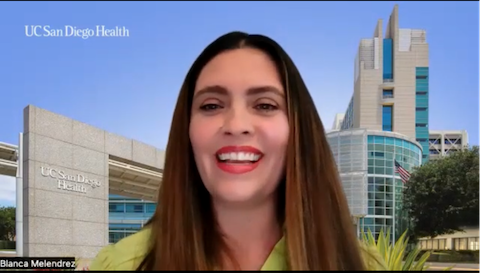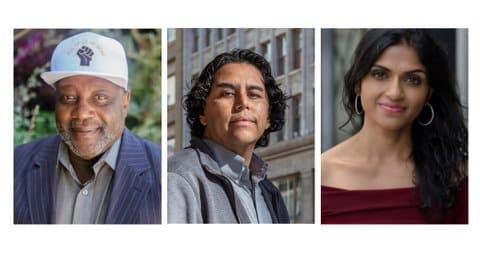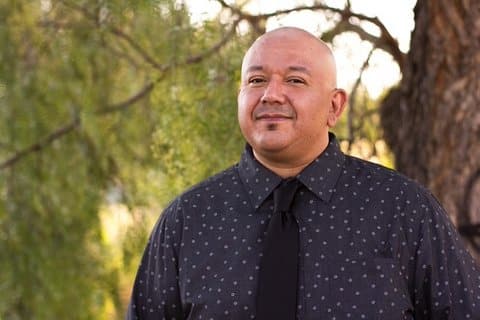
23 Apr James Irvine Foundation Award Winners Fostering Remedies to Urgent Issues

UC San Diego ACTRI Center for Community Health executive director Bianca Meléndrez is one of this year’s winners of the James Irvine Foundation awards. (Screenshot captured by Joe Porrello / The CC Pulse)
By Joe Porrello
Michelle Sisqueiros’ parents are immigrants both with a sixth-grade education. In her first year after graduating from college, she was preparing her parents’ taxes and was surprised to find that she had already made more money than both of them combined.
“That was just incredible to me — that I could make more than two people who worked in their fields for decades,” she said.
Knowing the value of a college degree, she now advocates for all Californians to have access to higher education as president of the Campaign for College Opportunity. Sisqueiros and CCO work to get financial aid for undocumented students, increasing community college Cal Grants, simplifying the transfer process, and more.
Her efforts have made Sisqueiros one of this year’s winners of the James Irvine Foundation Award. The recipients were also recognized in a March 26 Ethnic Media Services press teleconference as they discussed the solutions they and their organizations use to breed equality, as well as their personal ties to the work.
Sisqueiros says a lack of educational opportunity for some hurts everyone.
“We know that we can’t maintain our status as an economic force without educating Latinos, Black students, rural students,” she said. Regardless of their parents’ finances, “every talented student deserves a chance to go to college and succeed in our state.”
>>>Read: Student Debt Fuels Racial Wealth Gap, Advocates Say
Héctor Camacho and Elizabeth Baham also use schooling to make a difference with Reach University, which tackles the state’s scarcity of teachers with on-the-job degree and credential programs.
Its mission is to ensure “that all children in California have access to highly qualified and skilled teachers, particularly teachers and leaders that are reflective of the communities and the cultures of the children in the schools,” said Baham.
About 500,000 students entered a school building where one or more classrooms lacked permanent teachers in 2022, she said, also noting an estimated 10,000 vacancies along with about 20% of teachers retiring by 2027.
>>>Read: ‘We … Put Ourselves Last’: Former WCCUSD Teachers on Why They Left the Classroom
“They’re at risk of not meeting grade-level standards with such unpredictability,” said Baham. “We know that it leads to lower-quality instruction… inhibiting [students’] ability to achieve academically.”
Neither Baham nor Camacho had a teacher that looked liked them, they say — until they attended college, which the former says motivates them.
There is no time like the present to address the insufficiencies, noted Baham.
“Waiting for the right opportunity to come means we miss out on a whole generation of kids,” she said. “We don’t want children replicating our experiences with no anchor… in a space they will spend 13 years of their lives.”
As gay men spending their formative years in Visalia, award recipients Brian Poth and Nick Vargas felt they lacked support.
“In high school, I knew that I was gay, and I felt that it wasn’t safe for me to stay in the area,” said Vargas.
They both left to attend college in more liberal areas — Poth in Los Angeles; Vargas, the Bay Area — before eventually coming back to their hometown to try instilling the same type of acceptance there that they experienced while away.
“I had no plans to ever return… but when I did return, it felt like Visalia was 10 years behind what I was used to in San Francisco,” said Vargas. “There weren’t any permanent gathering spaces for queer people; there was a lack of healthcare and mental healthcare.”
>>>Read: Richmond’s LGBTQ Community Wants More Safe Spaces
Now, they are working to change things with The Source LBGT+ Center, which provides mental health assistance, peer support, youth leadership opportunities and other programs and services in the Central Valley.
“You can stay and be gay. We love to say that because it wasn’t true for us… and still for some folks, it’s not true these days,” said Poth.
Though they have made significant strides to improve the disparities mentioned, both Poth and Vargas said their county still pales in comparison with more progressive areas.
The former noted that providers in their area still practice conversion therapy, which claims to alter sexual orientation or gender identity. The widely discredited practice can be very psychologically damaging and physically dangerous.
UC San Diego ACTRI Center for Community Health executive director Bianca Meléndrez and director Amina Sheik Mohamed are trying to make sure a person’s physical well-being is not affected by their race, background or culture.
“These communities face many injustices and systemic racism, and this exacerbates health disparities,” said Meléndrez. “We see barriers to accessing healthcare due to language differences, lack of knowledge about where these services could be available, the fear of deportation, the trauma of displacement.”
For over two decades, the center has advocated for immigrants and refugees in areas such as housing instability, food insecurity, and employment roadblocks — which, as Meléndrez noted, can all negatively affect health.
Coming to the U.S. as an undocumented child, she has firsthand exposure to such discrepancies, which made her inclined to do something about it.
The center has connected with over 50,000 households through its nutrition incentive program, Más Fresco, which offers up to $100 per month to buy produce.
Mohamed finds collaboration and the empowerment of local people imperative in the fight for equality.
“We need many different sectors to be together to make sure we’re building up systems that are easier for refugees to navigate,” she said.
Manjusha Kulkarni leads the AAPI Equity Alliance, a coalition of more than 40 community-led organizations that focuses on policy building, advocacy and civic engagement for Asian and Pacific Islander communities throughout California.
In 2020, the organization founded Stop AAPI Hate, a movement that would be nationally adopted. It is also the regional lead of California’s Stop the Hate grant program.
>>>Read: Racism and Violence Against AAPI People ‘Is Nothing New’
The bigotry it is reducing, Kulkarni says, becomes more difficult to extinguish during a time when hate has penetrated politics and policies.
“When elected leaders and candidates use racist rhetoric, it does actually result in more hate incidents,” she said. “You have one of the two main candidates for president scapegoating immigrant communities, calling us animals, saying that we’re not people, that we’re criminals.”
According to Kulkarni, Iowa caucus voters were asked in a poll if they agreed with Trump’s statement that immigrants were “poisoning the blood of this country,” and 70-80% agreed.
>>>Read: Hate on the Rise, Politics Partly to Blame
Kulkarni went on to say that if elected, Trump will begin mass deportations and detentions of millions of Californians.
“This is in fact the most important election of our lifetime,” she said. “We have to ensure that our community members are prepared to vote.”
Regardless of obstacles in their way, all who received the award trudge forward battling to make inclusion mandatory.
“We’re not just participants,” said Meléndrez. “We’ve been at the forefront of change.”
The James Irvine Foundation is accepting nominations for the 2025 awards. Anyone who knows an inspirational leader or leadership pair can nominate them at www.irvineawards.org until April 24.
Winners’ organizations will receive a $350,000 grant.





No Comments